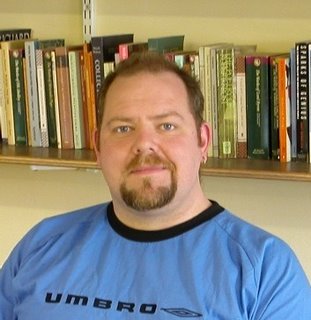 Good to have Nigel McLoughlin (pictured) as the featured poet this Friday. He's one of the impressive new voices of his generation.
Good to have Nigel McLoughlin (pictured) as the featured poet this Friday. He's one of the impressive new voices of his generation.He is also Reader in Creative Writing at the University of Gloucestershire and his work has been twice short-listed for a Hennessy Award, and placed in The Kavanagh Prize and The New Writer Poetry Prize.
McLoughlin lectured in Traditions at Poets’ House from 2000 to 2004 and has worked as a tutor with the London School of Journalism and as a Senior Tutor and Curriculum Design Consultant with the Open College of the Arts. He holds an MA with Distinction in Creative Writing and a PhD from Lancaster University.
He has written four collections of poetry: At The Waters’ Clearing (Flambard/Black Mountain Press, 2001), Songs For No Voices (Lagan Press, 2004), Blood (Bluechrome, 2005) and Dissonances (Bluechrome, 2007). He also co-edited Breaking The Skin (Black Mountain Press, 2002) an anthology of new Irish poets. His New and Selected will be out soon, from Templar, I hear.
Most recently, McLoughlin became editor of the revamped Iota magazine.
After The Battle
Night cursed its way along the valley,
lay like a malartán in the cradle of two hills.
The moon like a burst of ore had shot through
the streams’ seep between the stones
and sifted ferric flakes downhill
from the battlefield where the weapons
rust their way to their oblivion
of soil and shattered bone.
Even the grass is vaguely ferrous,
the sharp blade hides that underhand
green, flicks it from the frosty
underside like a switchblade of colour.
Dew shod, I make my crossing
across a treachery of stones
my feet defy by gripping
before the crack splits the blue air
wide open and through it something
vast and dark at the corner of my eye
approaches, flutters, passes. Again
and I look down into the whiskey-
coloured water a long while before
I realize the ore that colours it. I drop
my gun – a splash – a crack off stone,
I feel the iron heat half-cauterise my side.
Who’d have thought that blood
could have been that colour.
poem by Nigel McLoughlin
Comments